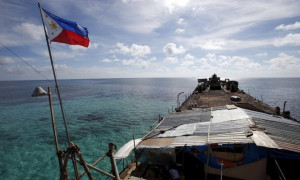
However, as previously predicted, in practical terms, the verdict has not impacted (at least not yet) China’s policy in the SCS as the country considered it “null and void”. Judging by statements made by the Chinese leadership, the development of infrastructure (which includes that of a military nature) on the islands and reefs of the SCS will continue.
China’s first response (after the PCA verdict) was rather straightforward and aimed at preventing potential complications in terms of relations with its southern neighbors that are in the regional association, ASEAN. China’s main “well-wishers” in the region represented by the USA and Japan would not miss the opportunity to take advantage of China’s latest problems in its foreign policy.
Therefore, the outcome of the two scheduled meetings between the Foreign Ministers initially of the ten member countries of ASEAN, and then those of ten plus China held on 24 and 25 July in Vientiane, the capital of Laos is of particular interest.
As the result of the 49th meeting of the Foreign Ministers of the ASEAN member states, a Joint Statement was adopted on “the Maintenance of Peace, Security, and Stability in the Region“. The document is written in rather general terms in a sense that it does not mention China and the PCA verdict.
In China, the verdict was generally positively received. China’s Foreign Minister, Wang Yi, felt it was necessary to mention the point that refers to the territorial disputes that threaten the “trusting relations” between the countries of the region. According to Wang, since this particular statement in the document does not mention China, there is nothing that requires comment.
As for the outcome of the meeting between the Foreign Ministers at the ASEAN-China forum, a Joint Statement was also adopted which contained a declaration on the need for “the Full and Effective Implementation” of the Declaration on the Conduct of the 11 countries in the SCS.
It should be highlighted that this Declaration that calls on its signatories to “respect freedom of navigation in and overflight above the South China Sea”, as well as resolve their territorial disputes “by peaceful means, without resorting to the threat or use of force” was signed back in 2002. 10 years later it still has not become a binding Code as was envisaged in 2002.
It is of particular note that further four years later the Parties to the Declaration deemed it necessary to state the need to “effectively implement” it.
Everything is clarified in paragraph 3 of the Joint Statement, which bears quoting in full: “The Parties undertake to exercise self-restraint in the conduct of activities that would complicate or escalate disputes and affect peace and stability including, among others, refraining from action of inhabiting on the presently uninhabited islands, reefs, shoals, cays, and other features and to handle their differences in a constructive manner.”
However, China’s undertaking to artificially transform uninhabited reefs into inhabited islands with military infrastructure in recent years has brought about protests from its southern neighbours, first and foremost, the Philippines and Vietnam. However, given that the Joint Statement of the Parties at the ASEAN-China forum does not specifically indicate anyone as a violator of the above requirements, then why would China not sign it?
Since the documents drawn up in Vientiane do not mention the Hague arbitration or the specifics of the territorial disputes in the SCS, China considered them an example of its successful diplomacy. Incidentally, the USA and Japan are also of the opinion that both events in Vientiane resulted in “China scoring a diplomatic victory”.
China’s victory will be further strengthened if the statements of the new President of the Philippines, Rodrigo Duterte, on the need to improve China-Philippine
Duterte’s decision to appoint 88-year-old Fidel Ramos, who served as president of the Philippines in 1992-1998, as special envoy to China garnered attention. China welcomed the appointment on the whole, noting that during Ramos’ presidency, bilateral relations were developed in all areas.
In its relations with the ASEAN countries, China lays emphasis on the economic component, indicating that no “arbitration” should interfere with its successful development.
Last year, China’s trade with ASEAN countries reached a colossal $472 billion and the parties stand to lose out from any aggravation of the situation in the region. According to Wang, at the China-ASEAN forum, 80% of the time was devoted to economy and only 20% to the situation in the SCS.
Yet, China hardly has any reason to particularly highly appraise the aforementioned positive aspects in its relations with its southern neighbors as they primarily concern the tactical success of Chinese diplomacy in the SCS.
As the nature of the development of the strategic situation is defined (and will continue to be defined) by relations with Beijing’s major geopolitical opponents primarily with Washington, that secured backing for its actions in the SCS in the form of the aforementioned Hague arbitration.
The latter can be referred to in a derogatory manner or ignored altogether. However, it has already wormed its way into the situation, under the all-encompassing category of “international law” and, therefore, will influence the development of China’s relations with its southern neighbors as well as the situation in the SCS as a whole for years to come.
Vladimir Terekhov, expert on the issues of the Asia-Pacific region, exclusively for the online magazine “New Eastern Outlook”.
